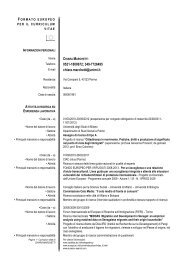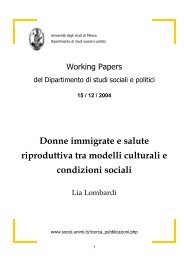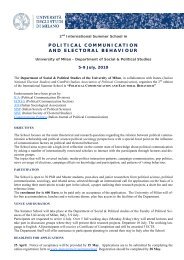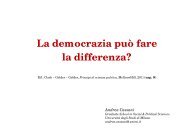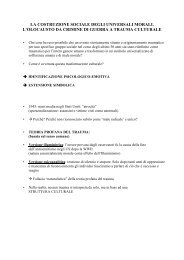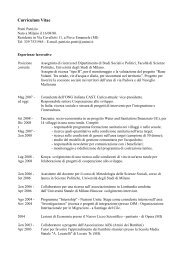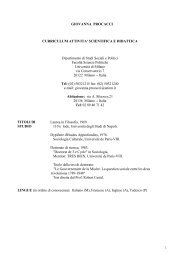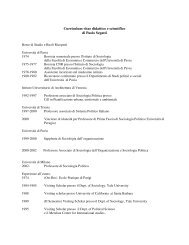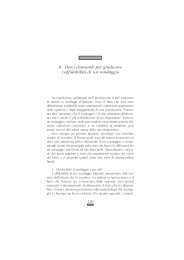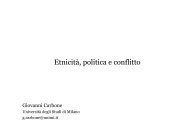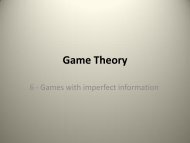The european dimension of political discourse in Italy. A ... - CIRCaP
The european dimension of political discourse in Italy. A ... - CIRCaP
The european dimension of political discourse in Italy. A ... - CIRCaP
You also want an ePaper? Increase the reach of your titles
YUMPU automatically turns print PDFs into web optimized ePapers that Google loves.
THE EUROPEAN DIMENSION OF POLITICAL DISCOURSE IN ITALY.<br />
sources <strong>of</strong> the Italian economic crisis. Follow<strong>in</strong>g the ideological argument <strong>of</strong> European<br />
<strong>in</strong>tegration serv<strong>in</strong>g American <strong>in</strong>terests, the Common Market was f<strong>in</strong>ally presented by the Pci<br />
as an American <strong>political</strong>-military platform to control Western Europe. Nevertheless, <strong>in</strong> spite <strong>of</strong><br />
the strong opposition to European <strong>in</strong>tegration, it is <strong>in</strong>terest<strong>in</strong>g to see that if until the end <strong>of</strong> the<br />
fifties the party asked the dissolution <strong>of</strong> the Common Market, by the beg<strong>in</strong>n<strong>in</strong>g <strong>of</strong> the sixties<br />
there was a change <strong>of</strong> strategy. Evaluation <strong>of</strong> the Common Market was still very negative<br />
and there was a perfect cont<strong>in</strong>uity on this judgement dur<strong>in</strong>g the twenty years after WWII. But<br />
the party did not call for the dissolution <strong>of</strong> the Common Market any longer, <strong>in</strong>stead it claimed<br />
its transformation <strong>in</strong> a new entity, able to develop cooperation with Eastern Europe, as well<br />
as with other world areas. We can summarise such a strategic change with the follow<strong>in</strong>g<br />
passage from the 1963 electoral platform:<br />
<strong>The</strong> Common Market, the communists have always been aga<strong>in</strong>st to because <strong>of</strong> its <strong>political</strong> goals<br />
l<strong>in</strong>ked to the Cold War and <strong>of</strong> the support it gives to the ma<strong>in</strong> <strong>in</strong>terest groups, has become a cage<br />
with<strong>in</strong> which <strong>Italy</strong> is constra<strong>in</strong>ed, ruled by the most reactionary <strong>in</strong>ternational groups. For this<br />
reason, the Pci asks...that the barriers <strong>in</strong>troduced by the Common market are overcome and<br />
start<strong>in</strong>g by the revision <strong>of</strong> the Treaty <strong>of</strong> Rome, a greater cooperation is developed at the European<br />
as well as at the global level, open to the socialist and to the neutral countries.<br />
Even if from the sixties, the party started to develop a more pragmatic orientation towards<br />
European <strong>in</strong>tegration and shifted from claims to stop the process and annul its outcomes to<br />
demands for deep reform, the attitudes <strong>of</strong> the Communists were still very negative, when<br />
they did not simply ignore the issue. Specific proposals for a reform <strong>of</strong> the Common Market<br />
were still quite rare <strong>in</strong> party documents, s<strong>in</strong>ce for the party European <strong>in</strong>tegration was not an<br />
easy issue to <strong>in</strong>vest on. <strong>The</strong> rejection <strong>of</strong> the process <strong>of</strong> European <strong>in</strong>tegration was imposed by<br />
the Soviet Union to all Western Communist parties. As a consequence, the evolution from<br />
the traditional party <strong>in</strong>ternationalism was a process that developed dur<strong>in</strong>g a long time and<br />
that produced several <strong>in</strong>termediate outcomes before shift<strong>in</strong>g <strong>in</strong>to pro-European positions.<br />
From our analysis <strong>of</strong> the party documents it seems that the beg<strong>in</strong>n<strong>in</strong>g <strong>of</strong> the seventies can be<br />
taken as a watershed: the party ceased to present the EEC as a by-product <strong>of</strong> US<br />
imperialism, some k<strong>in</strong>d <strong>of</strong> <strong>in</strong>tegration started to be supported, thus shift<strong>in</strong>g the overall attitude<br />
to European <strong>in</strong>tegration from Hard to S<strong>of</strong>t Euroscepticism (table 4). <strong>The</strong> historical impact <strong>of</strong><br />
the external and “communicative” <strong>discourse</strong> on European <strong>in</strong>tegration developed by the Pci <strong>in</strong><br />
the years <strong>of</strong> the “Eurocommunist shift” is well known (Webb 1979; Maggiorani 1998). It is<br />
more difficult to say to what extent such a shift was due to a s<strong>in</strong>cere “conversion” <strong>of</strong> the core<br />
elite or, otherwise, it came after a difficult phase <strong>of</strong> reshap<strong>in</strong>g the party strategy. What we<br />
know, <strong>in</strong> this respect, is that the responsibility to justify the new position was delegated to a<br />
21



